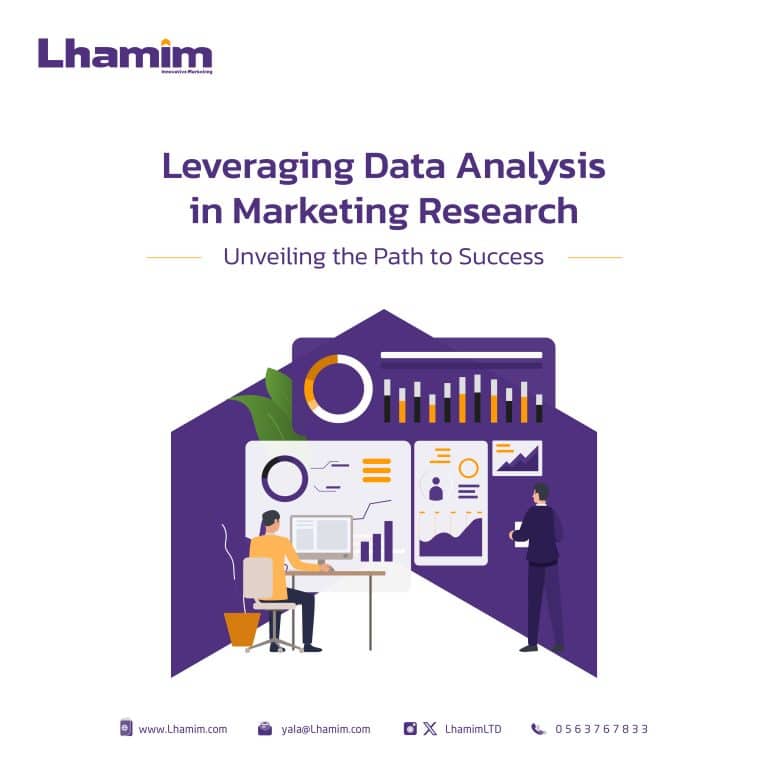With the rise of digital marketing and the ever-expanding reach of technology, data analysis has become an indispensable tool for businesses seeking marketing success. The journey begins with data collection and management, where advanced tools and technologies streamline the process of gathering valuable information from multiple sources. However, collecting data is only the first step; ensuring data quality and accuracy is equally critical. Marketers must implement robust data validation processes to avoid misleading insights that could lead to faulty decisions.

Exploratory Data Analysis (EDA): a powerful technique in data analysis, lays the groundwork for deeper insights. By visualizing data and identifying patterns, trends, and anomalies, businesses can identify hidden opportunities and challenges. Moreover, EDA helps marketers identify key variables that influence consumer behavior, empowering them to tailor marketing strategies accordingly.
Data-Driven Decision-Making: A Key to Marketing Success
Descriptive analytics provides a comprehensive overview of past performance and customer demographics. By visualizing data through charts, graphs, and dashboards, marketers can easily interpret complex information and make data-driven decisions. Understanding customer demographics and segmentation is crucial for crafting personalized marketing campaigns that resonate with specific target audiences.
However, in the fast-paced world of marketing, what sets apart the leaders from the rest is the ability to predict future trends and customer behavior. Predictive analytics employs advanced statistical algorithms and machine learning models to forecast consumer preferences, market trends, and even potential churn. Armed with predictive insights, marketers can proactively design marketing strategies that anticipate customer needs and preferences, staying one step ahead of the competition.
Understanding Consumer Sentiments: The Power of Sentiment Analysis
In the age of social media and online reviews, monitoring and understanding customer sentiments have never been more critical. Sentiment analysis enables businesses to gauge public opinions, emotions, and attitudes towards their brand. By analyzing customer feedback, comments, and reviews, companies can gain valuable insights into brand perception and reputation.
Positive sentiments can be leveraged to bolster brand advocacy, while addressing negative sentiments can help mitigate potential crises and improve customer satisfaction. Sentiment analysis also enables marketers to identify emerging trends and capitalize on viral moments, driving engagement and brand loyalty.

The Competitive Edge of Data Analysis in Marketing Research
Gaining a competitive advantage in the modern business landscape requires a keen understanding of the competition. Through data analysis, businesses can examine their competitors’ marketing strategies, strengths, and weaknesses. Monitoring market trends, industry shifts, and customer preferences empowers businesses to make proactive decisions and seize emerging opportunities.
Moreover, by harnessing data analysis, companies can respond swiftly to market changes, adjusting their marketing strategies in real-time. Agile marketing, driven by real-time analytics, ensures that businesses remain adaptable and responsive, capitalizing on favorable trends and mitigating potential threats.
Overcoming Challenges and Ensuring Ethical Data Practices
While the benefits of data analysis in marketing research are undeniable, it is crucial to navigate potential challenges and ethical considerations. Data privacy and compliance are paramount concerns, with consumers increasingly conscious of how their data is used. Companies must prioritize ethical data practices, being transparent with customers about data collection and usage, and adhering to data protection regulations.
Data integration and interoperability can pose technical challenges, with businesses often dealing with disparate data sources. Utilizing data analysis tools with seamless interoperability can facilitate a holistic view of the data, allowing for more comprehensive insights.
In the age of cyber threats and data breaches, data security remains a top priority. Marketers must implement robust cybersecurity measures to safeguard sensitive customer information and protect the integrity of the data they analyze. This includes investing in secure data storage, encryption protocols, and regular security audits to ensure that customer data remains confidential and protected.

The Future of Data Analysis in Marketing Research
As technology continues to advance at an unprecedented pace, the future of data analysis in marketing research holds exciting possibilities. Advancements in artificial intelligence (AI) and machine learning (ML) are transforming the landscape, automating data analysis processes and uncovering deeper insights. AI-powered algorithms can analyze vast amounts of data with speed and accuracy, allowing marketers to focus on strategic decision-making.
Real-time analytics is another area poised for growth. The ability to access and interpret data in real-time provides marketers with timely insights to adapt their strategies quickly. Real-time analytics enables businesses to seize fleeting opportunities, respond to customer demands instantly, and optimize marketing campaigns on the fly.
Ethics and transparency will continue to be at the forefront of data analysis in marketing research. Companies must strike the right balance between personalization and privacy, ensuring that customer data is collected and used ethically and transparently. Building trust with customers is essential in the data-driven era, and businesses that prioritize ethical data practices will reap long-term benefits.
Conclusion
Data analysis plays a vital role in modern marketing research. From collecting and analyzing data to making data-driven decisions and understanding customer sentiments, data analysis contributes to improving marketing strategies and enhancing communication with the target audience. With the continuous advancement of technology, data analysis in marketing research is expected to evolve, driven by artificial intelligence, real-time analytics, and ethical practices.
Therefore, harness the power of data analysis in marketing research, invest in advanced tools and techniques, and unlock the full potential of your marketing strategies. With data as your compass, success awaits you in the dynamic world of marketing.
Our market research formulated by our consultants enables you to get a grip on attracting customers and accelerating sales. contact us now.

